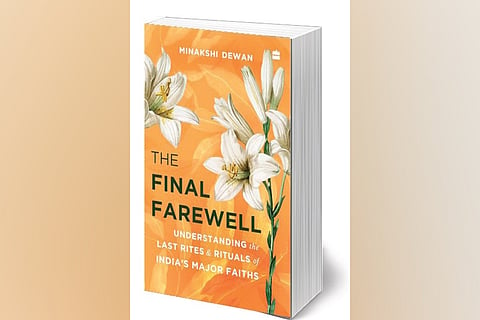

Writer Minakshi Dewan was very close to her father, Vijay Dewan, an entrepreneur. He lived in Ambala Cantonment in Haryana. But in 2019, because of liver sclerosis, Vijay passed away. His death came as a shock to Minakshi.
She lit the funeral pyre and immersed her father’s ashes in the Ganges at Haridwar. During this time, she conversed with the purohits and became fascinated by the rituals at the end of life. That’s when she got the idea for writing this book.
She began her research by visiting shamshans and kabristans in Delhi. Minakshi also went to the Harishchandra and Manikarnika ghats in Varanasi. She read articles, newspaper clippings, books and watched films on the subject. She interviewed journalists, activists, funeral directors, academicians and filmmakers, among many others.
The Final Farewell, a product of all of this, is her attempt to decode death, as she explores the nuances of the last rites in Hinduism, Islam, Christianity, Zoroastrianism and Sikhism. It is a valuable book because it gives followers of each religion an insight into the meanings behind their rituals, which most people tend to perform mechanically. One also gets an idea of the rituals of other religions, creating an opportunity to evoke empathy and understanding of other religions, especially at a time of grave communal polarisation in the world.
For example, the washing of a deceased person in Islam begins on the right side. The first wash is with plain water, the second with soap, and the final one with camphor. The tradition is to wrap the corpse with three unstitched pieces of cloth: an izar (wraparound), a qamis (shirt) and a lifafa, which covers the entire body from head to feet.
Minakshi has also focused on Hindu and Sikh women performing the last rites. Manisha Shete, a Hindu priest practising for 15 years, is quoted saying, “I pursued this work because of my interest in ancient scriptures. I am the first in my family to become a priest.” Manisha is associated with the Pune-based Jnana Prabodhini, an organisation that trains men and women across castes to perform rituals. The author has also described the state of cremation and burial spaces, the gender and caste discrimination in last rites, and professional mourners like rudaalis. A particularly interesting chapter is on Varanasi, which Minakshi says, “celebrates death”.
Each religion has its own beliefs about what happens after death. In Zoroastrianism, for example, the Parsis believe humans comprise gaetha (physical) and mainyu (spiritual) elements. Humans have an immortal urvan (soul), which remains near the body for three days and nights before departing. On the fourth day, the sun’s rays draw up the soul for judgement. It has to cross the Chinvat Bridge, which becomes wider or narrower, depending on the life the person led. Comprising such nuanced details makes The Final Farewell a remarkable and valuable addition to India’s spiritual literature.
The Final Farewell
By: Minakshi Dewan
Publisher: HarperCollins
Price: Rs 499
Pages: 312